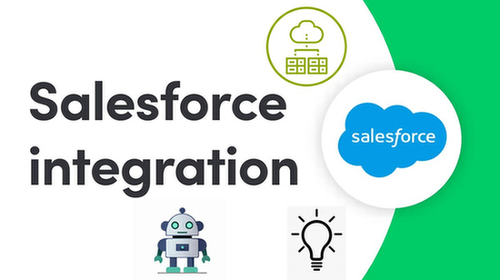
Data is the foundation of successful business in today’s digitally connected world. While conversations about the advantages of CRM platforms, such as Salesforce, frequently center on marketing and customer engagement, their substantial impact on enterprise operations is noteworthy. This article delves into how Salesforce can potentially transform business operations, emphasizing its importance as a crucial tool that warrants every CIO and CTO consideration.
Salesforce Beyond Marketing
Salesforce exceeds the role of a CRM solution, stretching its capabilities far beyond applications in marketing and customer engagement. As a comprehensive business integration solution, Salesforce is a robust platform that links front, middle, and back-office operations effortlessly. Consolidating data from diverse sources provides a panoramic view of the enterprise ecosystem.
The Role of Salesforce in Business Integration
Integrating diverse data sources and systems is not just a luxury—it’s a significant challenge and a necessity for modern businesses. Managing an ever-expanding array of data requires a centralized hub for data management, and Salesforce plays a crucial role in meeting this need.
Salesforce is a linchpin in facilitating seamless data flow across various parts of an organization. It bridges gaps between sales and customer data, operational teams, and financial and HR management, offering comprehensive integration of front-office, middle-office, and back-office functions.
Its exceptional ability to integrate seamlessly with various systems and applications sets Salesforce apart, opening up abundant business opportunities. By effortlessly connecting with existing software and databases, Salesforce becomes the central hub where data flows cohesively, eradicating data silos and streamlining processes.
Whether integrating with popular marketing tools, ERP systems, or custom-developed applications, Salesforce ensures that data from different sources harmoniously coexist. This harmony enables businesses to make more informed decisions, enhance customer experiences, and improve operational efficiency. The flexibility and adaptability in integration make Salesforce a transformative force for businesses, allowing them to leverage the full spectrum of their technological ecosystem to drive growth and innovation.
Benefits of Salesforce Integration with Business Applications
1. Enhanced Productivity
By integrating Salesforce, your business can attain manual data automation. Productivity will increase because your errors will be detected and removed along the way, dropping to an overall number of mistakes in your performance. A better way to put it is that your business will benefit from error-free, and fast results will be attained quickly.
2. Automated and Codeless Workflow
There needs to be more than just a system or an app; working together will allow the organization to accomplish its business aims, goals, and plans through point-and-click workflow automation.
3. Easy Data Access
Integration of apps means you can access data across different apps and easily migrate data. This is a powerful thing for the business as they can get valuable data that can be analyzed to get meaningful insights. All this in-depth knowledge will help a company make informed decisions and have a more strategic approach.
4. Produces Insightful Reports
An effective Salesforce integration allows businesses to access meaningful and managed reports. Again, as mentioned before, it helps the organization make informed and structured decisions and have a strategic approach.
5. Customer Retention
Getting customers is not a problem, but making them stay and become loyal customers is the actual dilemma. Having customers buy from you on a one-off basis is not your long-term goal; if it is, you must be on the right track. But making customers stay so that they purchase from you again and again is the goal you should be working towards. Integrating Salesforce with your business app increases the chance of customers sticking to your app in the long run. Why? Because an app is tailored, the better you target customers and connect to their routine tools, the more critical the app will become for them.
6. Improved Online Sales
An app is effective and easy to use, attracting many customers. Integrating Salesforce with your business apps will lead to an increase in online sales revenue in a matter of no time, amplifying the sales process at a faster rate. Customizing Salesforce will take your business to another new level.
7. Get Entire Customer Data in One Spot
Integrating Salesforce CRM with customer service, help service, and other supporting apps eases the connecting points of customer communication. An integrated, smooth system increases the complete effectiveness and efficiency of the company’s productivity.
8. Eases and Fastens Returns
Having interactive services is what customers love. Getting quick replies and prompt responses is an essential thing for customers. Salesforce integration with eCommerce permits customers to return a product quickly and get satisfactory service.
Wrapping It Up
Integrating Salesforce can be very beneficial for an organization, but this has to be done correctly. If this goes wrong, it can lead to losing some good clients. With the help of Salesforce integration, organizational performance can gain new heights every day. However, you must hire a Salesforce development and consulting company for a perfect and well-managed Salesforce implementation and integration service; that’s where we come in!